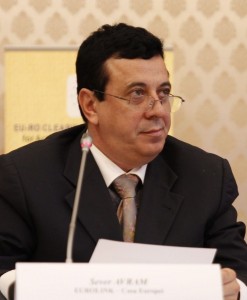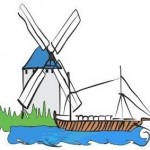<strong>“Danubian Bulletin”</strong>, edited by CLDR in partnership with CIO-SUERD, represents the first media project in the field of social-economic relaunching of the Danubian macro-region in view of supporting effective anf active project partnerships and consortia.
Editorial team:

Sever AVRAM is currently holding the position of Executive President of the CLDR Romania Association, member of the Executive Committee of the Council of Danube Cities and Regions (CoDCR – Vienna). He is the coordinator of the EUSDR Thematic Priority “Promoting Cities” within the Urban Platform Danube Region (Vienna).
Also, as Executive President of EUROLINK – House of Europe Foundation, he initiated in partnership with the Romanian Academy the establishing of the EUSDR International Honorary Chair “Jean Bart” and, as its General Coordinator, he promotes the creation of a first virtual University of Knowledge and Innovation. He was recently elected in the Executive Board of the Danubius Academic Consortium, the first co-operation and partnership network in the field of innovation and the promotion of antreprenorial education in the Danube Macro-region, coordinated by the International Institute of Integral Innovation (Baden Württemberg).
In the past, thanks to his dual background in Romanic Literature and Languages and of European Integration and Federalist Studies, he fulfilled various assignments as Senior Consultant for the Government of Romania and the European Commission and within other relevant European and international projects in fields such as: European Institutions, PR & Institutional Lobby, Danube Studies, gender equality.
The scientific and editorial activity mainly comprises studies, essays and articles on political analysis, social and cultural, as well as studies / European projects, which he coordinated in the past two decades.
Call-Declaration of Danubian Local Communities, Universities and NGOs
supporting the CLDR initiatives and major projects
CLDR Romania, association representative at national and European levels, established in November 2014, and affiliated to the Council of Danube Cities and Regions (CoDCR), appreciates that the deployment of the new edition of the Annual EUSDR Forum in Ulm (29-30 October 2015) and the Danube Participation Day would deserve to be commonly better valuated with the most appropriate institutional partners from the Danube Member States, especially with the members of the so-called trilateral group composed from Serbia, Bulgaria and Romania.
In this respect, as the high representatives of the local communities and the corporate members of the Urban Platform – Vienna agreed in December 2013, we estimate that now is highly needed a more opened, thematically consistent, integrative and transparent approach, developed in the spirit of an extended territorial co-operation, highly required by the European Commission – DG REGIO, the EUSDR Institutional Co-operation Coordinator – Municipality of Vienna and CoDCR. At this time, it is the right moment of achieving a real Danube added-value and of fulfilling a beneficial cross-road between the concept of Europe’s Industrial Renaissance through the SMART specialisations and the implementation of both EUSDR and strategic Investment Fund, supported by the President of the European Commission and the European Investment Bank.
Our organisation and its prestigious corporate partners believe that the Romanian state together with local communities and relevant pro-Danubian civil society organisations should picture themselves in a much more homogenous, coherent and disciplined way than it was the case until now. In order to reorient mainly towards major complex projects aimed to find rapid solutions to current or emerging challenges, CLDR kindly requests from the European Commission – DG REGIO, and from the Romanian Government – the President of the National EUSDR Forum/Romanian Ministry of European Affairs, that the local necessities and aspirations to be better consolidated and integrated in a unitary perspective.
In view of the forth-coming EUSDR Forum in Ulm, as well as of the previous numerous forums and large consultations from the last three years, with the Danubian Embassies, we succeed to reunite a short list of project proposals, which the Romanian Government should support and promote, especially in the context of the institutional lobby exercise to be deployed in Ulm. This is even more necessary, as it resulted after consultation with the partner associations of Danubian communities from Bulgaria and Serbia, as we plan to promote within the ARGE Donau Conference hosted by the next Ulm Forum.
-
“Danube Perls“ – Advancing the natural, cultural, historic heritage of the Danube through accessibility – proposed by CODATU Association in partnership with CLDR and other Danubian partners
-
“Danube ComIn” – Building a regional identity through Danubian cities – proposed by Health & Social Tourism Association in partnership with CLDR and other Danubian partners
-
“Danube Traverses”– Composition of traffic infrastructure of the Lower Danube – proposed by the Technological Center Sofia in partnership with CLDR and other Danubian partners
-
“Danubian Knowledge and Innovation University” – proposed by “Romania de Maine” Foundation in partnership with CLDR and other Danubian partners
-
“Danube Satellite Center” – Using satellite surveillance system for identification of non compliant waste landfills contaminated sites for the Danube Region – proposed by the National Agency for Environmental Protection in partnership with CLDR and other Danubian partners.
Following our recent visit payed to main European decision-makers in Brussels, we clearly understood that each flagship or major project should be supported by at least one priority area or Member State. In this respect, we already submitted a Memorandum to the Ministry of European Funds, which will represent the Romanian Government to the EUSDR Forum in Ulm, and we recommended a structured consultative mechanism with the EUSDR Consultative Council and mainly CLDR Romania. It will be highly regrettable if Romania would not enjoy this wonderful opportunity and will not announce in time the future priority projects, obviously after consultations with civil society relevant organisations and academia.
Also, as we are delighted to benefit of the personal support of more Members of the Parliament from the Belgrade Pro-Danube MEPs Group in Romania and in the European Parliament, we consider that the support from the Romanian central and local authorities for at least two strategic Romanian initiatives within the Strategic Investment Plan – “Danube Traverses” and “Danube Pearls” – remains highly needed and relevant for the European institutional lobby which we have to initiate.
However, we could not ignore that in the last nine years the absorption rate of the Structural Funds in Romania was the lowest in the European Union. In order to improve this process and radically change the situation, which increases the gap between upper and lower Danube areas, the territorial co-operation is to be stimulated and encouraged, mainly at general political level and by good practices promoters and knowledge transfer accelerators, as for example Steinbeis Foundation, hopefully in closer co-operation with the Romanian Academy and the EUSDR International Honorary Chair “Jean Bart”.
Through this common statement, on the occasion of the future CoDCR Congress in Ulm, we are committed to express, in the bottom up spirit of the Danube Strategy, these requirements and aspirations and succeed to win together a more enlightened place for the entire Danube macro-region.
CLDR – “Local Communities along the Danube River” Association
In November 2014, the “Local Communities along the Danube River” Association – CLDR Romania was established as a common initiative of Danubian local communities, universities, research centers and NGOs in Romania. We mention also that CLDR Romania was created to the kind scientific support of the Romanian Academy through its Center of Biodiversity, which also hosts the EUSDR International Honorary Chair “Jean Bart” (CIO-SUERD).
The main goal of the Association is to stimulate the participation of Romanian entities to the co-operation process of implementing the EU Strategy for the Danube Region (EUSDR). This is to be achieved through enabling CLDR as a networking, institutional lobby and inter-consultation platform between main European decision-makers and the Romanian stakeholders.
From the beginning, the Association enjoys of the personal support of the Coordinator of the Council of Danube Cities and Regions (CoDCR) Mr. Peter LANGER, of the EUSDR Priority Area Coordinator 10, Dr. Kurt PUCHINGER and of the EUSDR European Coordinator on the behalf of the European Commission, Mr. Marco ONIDA and of the Office of the National EUSDR Coordinator within the Romanian Ministry of Foreign Affairs.
At this stage, already 25 institutional members are part of CLDR Association: the City Halls of Harsova Town, Fetesti Municipality, Navodari Town, Comune of Ghindaresti, Comune of Topalu; EUROLINK – House of Europe Foundation; Romanian Ecological Action Foundation; Spiru Haret University – Romania of Tomorrow Foundation; Danubius University in Galati – “Benone Pusca”Foundation; Association „Architects without borders”; National Institute for Research and Development in Construction, Urban Planning and Sustainable Spatial Development “URBAN-INCERC”; National Association of Rural, Ecological and Cultural Tourism in Romania – ANTREC; Professional Association for Quality in Training for Public Administration – CINAQ; PartNET Association – Partnership for Sustainable Development; Alumni Association of the College of Europe – Romania; Romanian Academy – Center of Studies and Researches for Agrosilvical Biodiversity “Acad. David DAVIDESCU”; Geological Institute of Romania; Western University “Vasile Goldis” in Arad; Western University in Timisoara; Association Professional Consult 2009 in Craiova; Constanta Maritime University; Tomis University in Constanta – Gaudeamus Foundation; CODATU Association from Romania; Constanta Metropolitan Area; National Institute of Research and Development in Mechatronics and Measurement Technique (INCDMTM).
Regarding the international institutional affiliation, CLDR Romania is a member of the Urban Platform Danube Region (Vienna), where it coordinates the Thematic Priority “Promoting Cities” and of the Council of Danube Cities and Regions (CoDCR). Very recently, we started a closer dialogue and a future co-operation with the International Institute for Integral Innovation (Germany), chaired by Prof. George TEODORESCU.
Since its official inauguration at the Palace of Cotroceni (November 2014), CLDR constituted four Working Groups, corresponding to the Donau ARGE in Vienna. Also, CLDR organised in collaboration with CIO-SUERD “Jean Bart” two important European events: on the occasion of the European Maritime Day in May 2015 – the fifth edition of the Black Sea Danube Innovation Forum; on the occasion of the official visit of the EUSDR European coordinator in September 2015, as a culmination of our information & training session and post-graduate program, the first edition of the Danubian Young Leaders Academy.
In order to increase the establishing of consortia and submitting common projects, we already concluded cooperation agreements with both Bulgarian and Serbian Danubian communities associations. Also, in the presence of the Coordinator of CoDCR, Mr. Peter LANGER, we organised two common meetings with Romanian and Bulgarian mayors and other stakeholders in the two countries plus Serbia in order to advance two major significant projects: “Composition of traffic infrastructure at the lower Danube” and “Advancing the natural-cultural-historic heritage of the Danube through accessibility”.
We also launched the initiative “Danubian Inter-Academic Co-operation Center” for enhancing the interaction between Romanian universities, SMEs and regional decision-makers, aimed to generate a larger construction called “Danubian Knowledge & Innovation University” with the kind support of JRC and of the Danubian Academic Consortium.



